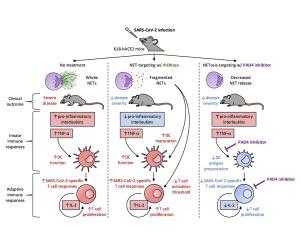PAD4 inhibition impacts immune responses in SARS-CoV-2 infection
IF 7.6
2区 医学
Q1 IMMUNOLOGY
引用次数: 0
Abstract
Protein arginine deiminase 4 (PAD4) has emerged as a potential therapeutic target for various diseases due to its role in promoting neutrophil extracellular trap (NET) formation. NETs, composed of DNA and antimicrobial proteins, serve as a defense mechanism against pathogens but can also drive lung injury, particularly in SARS-CoV-2 infection. In this study, we examined the effects of PAD4 inhibition on clinical outcomes and adaptive immunity within the context of SARS-CoV-2 infection. Our results show that PAD4 pharmacological inhibition reduced lung NET concentration and improved clinical outcomes, similar to treatment with recombinant human DNase (rhDNase), which degrades NET structure. However, in contrast to rhDNase, PAD4 targeting diminished virus-specific T cell responses by impairing dendritic cell antigen presentation and reducing IL-2 signaling by affecting its production by T cells. In line with these observations, PAD4 pharmacological inhibition diminished antigen-specific T cell responses in a model of lung inflammation. These findings highlight the importance of carefully evaluating PAD4 as a therapeutic target in COVID-19, given its potential to compromise adaptive immune responses crucial for fighting the virus.

抑制PAD4对SARS-CoV-2感染免疫应答的影响
蛋白精氨酸脱亚胺酶4 (PAD4)因其在促进中性粒细胞胞外陷阱(NET)形成中的作用而成为多种疾病的潜在治疗靶点。NETs由DNA和抗菌蛋白组成,可作为抵御病原体的防御机制,但也可导致肺损伤,特别是在SARS-CoV-2感染中。在这项研究中,我们研究了在SARS-CoV-2感染的背景下,PAD4抑制对临床结果和适应性免疫的影响。我们的研究结果表明,PAD4药物抑制降低了肺部NET浓度,改善了临床结果,类似于用重组人dna酶(rhDNase)治疗,后者会降解NET结构。然而,与rhDNase相反,PAD4靶向通过损害树突状细胞抗原呈递和通过影响T细胞的IL-2信号传导减少病毒特异性T细胞反应。与这些观察结果一致,在肺部炎症模型中,PAD4药理抑制降低了抗原特异性T细胞反应。这些发现强调了仔细评估PAD4作为COVID-19治疗靶点的重要性,因为它有可能损害对对抗病毒至关重要的适应性免疫反应。
本文章由计算机程序翻译,如有差异,请以英文原文为准。
求助全文
约1分钟内获得全文
求助全文
来源期刊

Mucosal Immunology
医学-免疫学
CiteScore
16.60
自引率
3.80%
发文量
100
审稿时长
12 days
期刊介绍:
Mucosal Immunology, the official publication of the Society of Mucosal Immunology (SMI), serves as a forum for both basic and clinical scientists to discuss immunity and inflammation involving mucosal tissues. It covers gastrointestinal, pulmonary, nasopharyngeal, oral, ocular, and genitourinary immunology through original research articles, scholarly reviews, commentaries, editorials, and letters. The journal gives equal consideration to basic, translational, and clinical studies and also serves as a primary communication channel for the SMI governing board and its members, featuring society news, meeting announcements, policy discussions, and job/training opportunities advertisements.
 求助内容:
求助内容: 应助结果提醒方式:
应助结果提醒方式:


